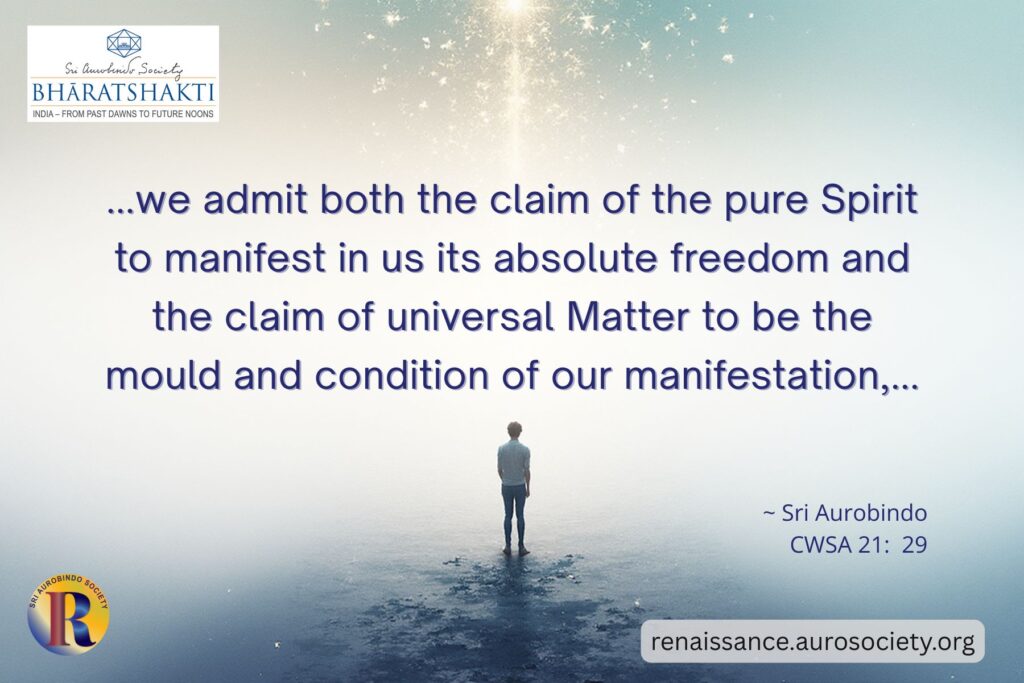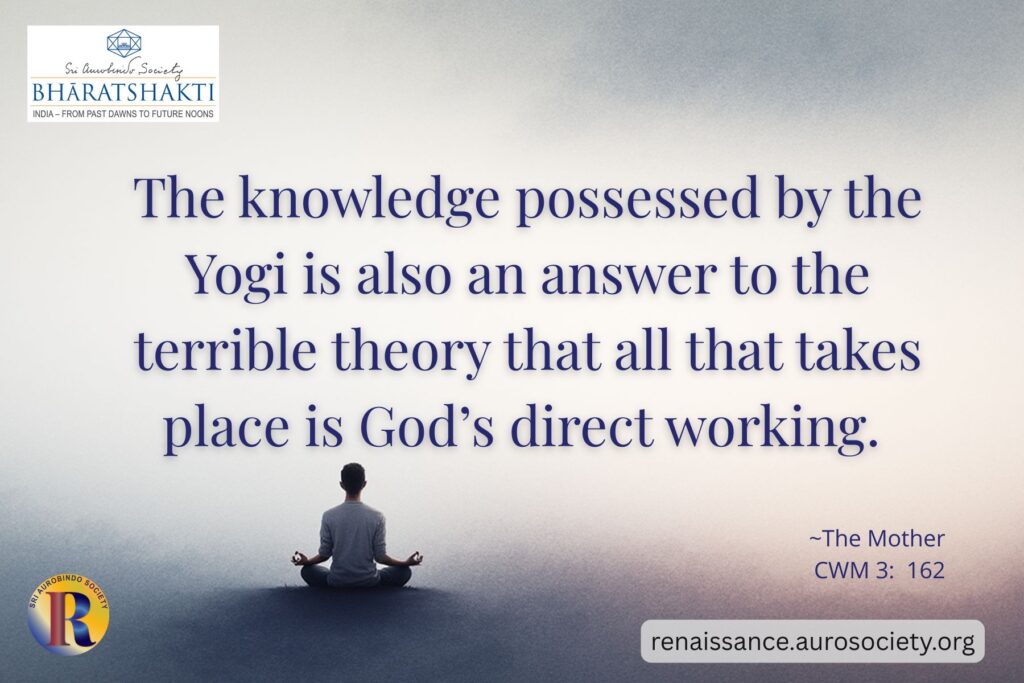Editor’s note: We present a few excerpts from a chapter titled ‘Self-surrender in works: The Way of the Gita’ from Sri Aurobindo’s volume, The Synthesis of Yoga. In this chapter he describes most perfectly the key principles of the Karmayoga as laid down in the Bhagavad Gita. The editors have made a few formatting changes for the ease of online readability, without alterning anything in the text.

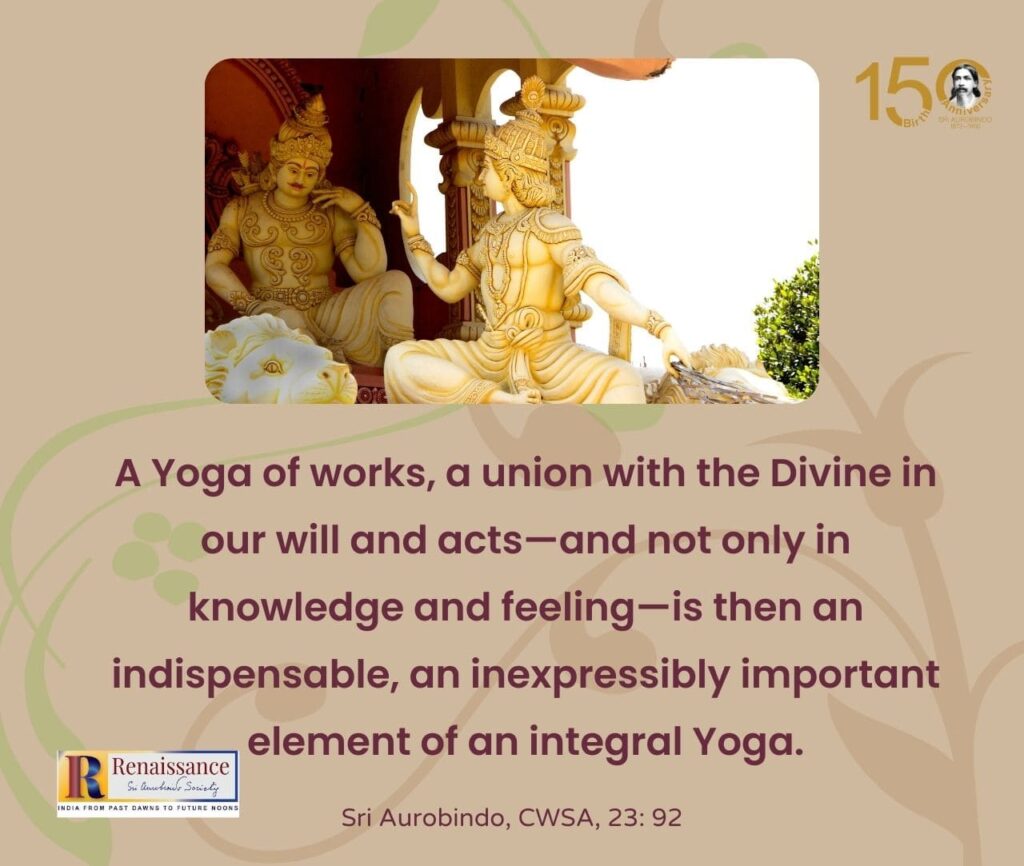
A Harmony of Inner and Outer Life
In the ordinary human existence an outgoing action is obviously three-fourths or even more of our life. It is only the exceptions, the saint and the seer, the rare thinker, poet and artist who can live more within themselves; these indeed, at least in the most intimate parts of their nature, shape themselves more in inner thought and feeling than in the surface act.
But it is not either of these sides separated from the other, but rather a harmony of the inner and the outer life made one in fullness and transfigured into a play of something that is beyond them which will create the form of a perfect living.
A Yoga of works, a union with the Divine in our will and acts—and not only in knowledge and feeling—is then an indispensable, an inexpressibly important element of an integral Yoga. The conversion of our thought and feeling without a corresponding conversion of the spirit and body of our works would be a maimed achievement.
But if this total conversion is to be done, there must be a consecration of our actions and outer movements as much as of our mind and heart to the Divine. There must be accepted and progressively accomplished a surrender of our capacities of working into the hands of a greater Power behind us and our sense of being the doer and worker must disappear.
All must be given for a more direct use into the hands of the divine Will which is hidden by these frontal appearances; for by that permitting Will alone is our action possible. A hidden Power is the true Lord and overruling Observer of our acts and only he knows through all the ignorance and perversion and deformation brought in by the ego their entire sense and ultimate purpose. [. . .]
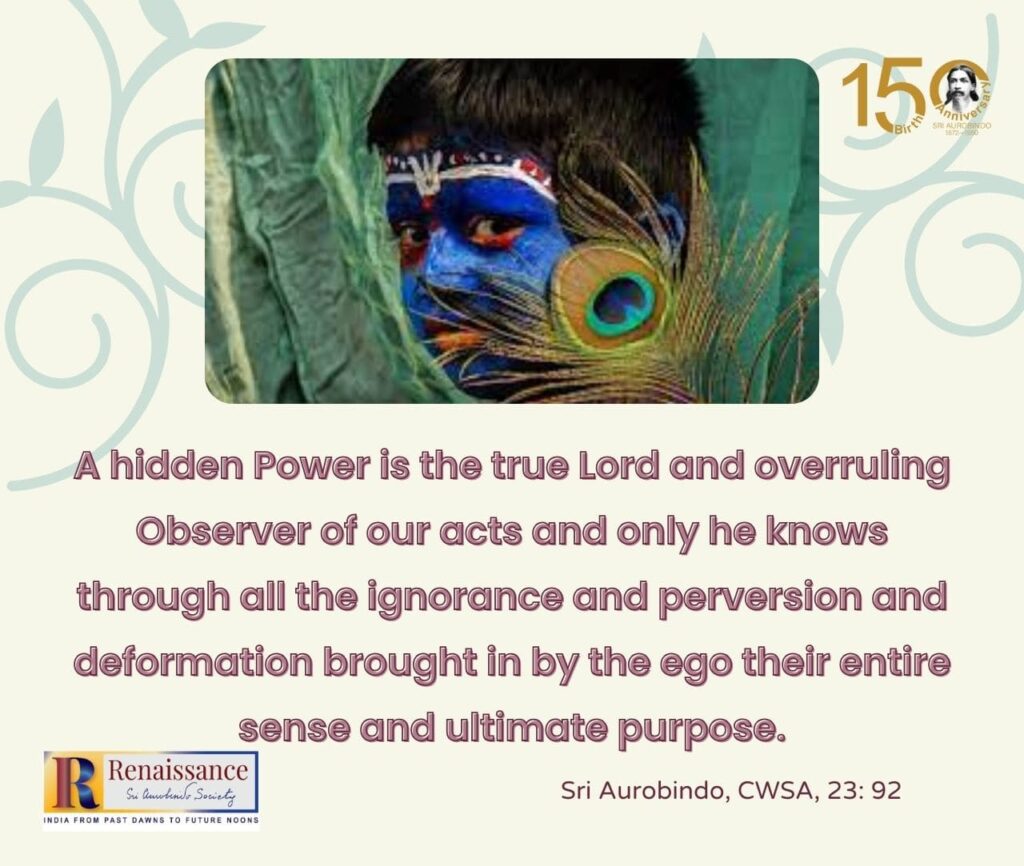
Karmayoga of the Gita
Even for those whose first natural movement is a consecration, a surrender and a resultant entire transformation of the thinking mind and its knowledge, or a total consecration, surrender and transformation of the heart and its emotions, the consecration of works is a needed element in that change.
Otherwise, although they may find God in other-life, they will not be able to fulfil the Divine in life; life for them will be a meaningless undivine inconsequence. Not for them the true victory that shall be the key to the riddle of our terrestrial existence; their love will not be the absolute love triumphant over self, their knowledge will not be the total consciousness and the all-embracing knowledge. [. . .]
The greatest gospel of spiritual works ever yet given to the race, the most perfect system of Karmayoga known to man in the past, is to be found in the Bhagavad Gita. In that famous episode of the Mahabharata the great basic lines of Karmayoga are laid down for all time with an incomparable mastery and the infallible eye of an assured experience. [. . .]
Lines of Karmayoga Laid Down by the Gita
Its key principle, its spiritual method, can be summed up as the union of two largest and highest states or powers of consciousness, equality and oneness.
The kernel of its method is an unreserved acceptance of the Divine in our life as in our inner self and spirit. An inner renunciation of personal desire leads to equality, accomplishes our total surrender to the Divine, supports a delivery from dividing ego which brings us oneness.
But this must be a oneness in dynamic force and not only in static peace or inactive beatitude.
The Gita promises us freedom for the spirit even in the midst of works and the full energies of Nature, if we accept subjection of our whole being to that which is higher than the separating and limiting ego. It proposes an integral dynamic activity founded on a still passivity; a largest possible action irrevocably based on an immobile calm is its secret,—free expression out of a supreme inward silence. [. . .]
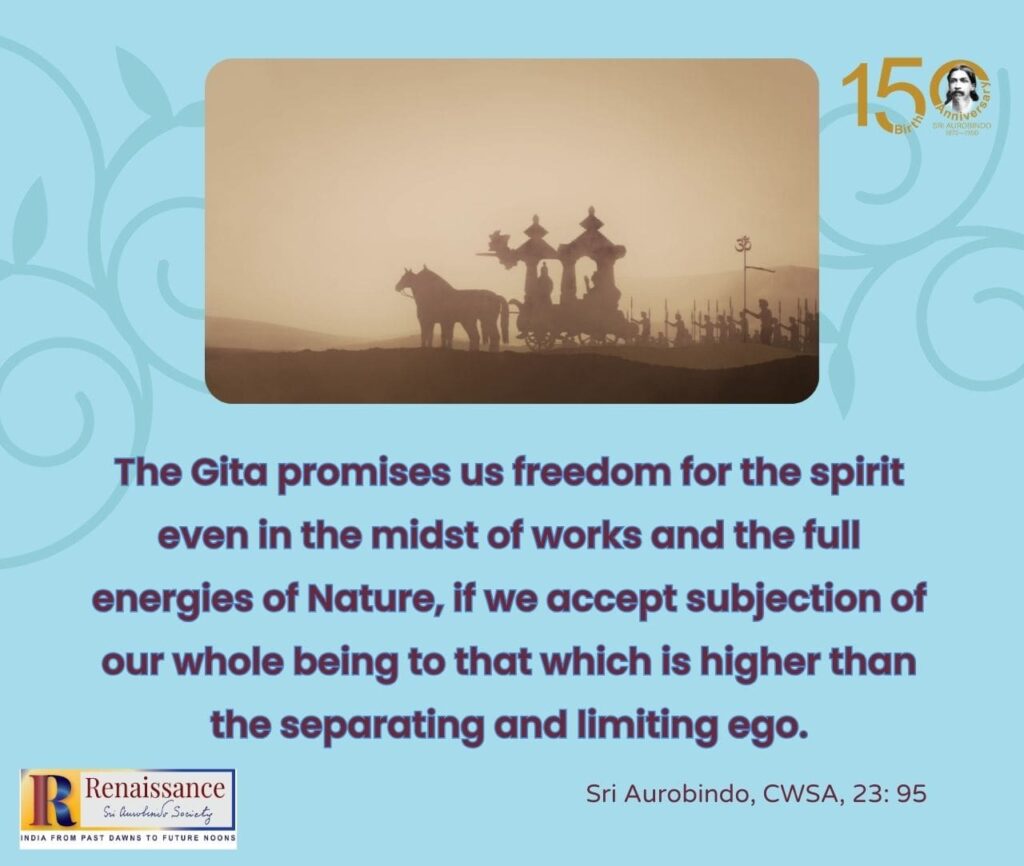
These are the conditions of our effort and they point to an ideal which can be expressed in these or in equivalent formulae.
- To live in God and not in the ego; to move, vastly founded, not in the little egoistic consciousness, but in the consciousness of the All-Soul and the Transcendent.
- To be perfectly equal in all happenings and to all beings, and to see and feel them as one with oneself and one with the Divine; to feel all in oneself and all in God; to feel God in all, oneself in all.
- To act in God and not in the ego.
- And here, first, not to choose action by reference to personal needs and standards, but in obedience to the dictates of the living highest Truth above us.
- Next, as soon as we are sufficiently founded in the spiritual consciousness, not to act any longer by our separate will or movement, but more and more to allow action to happen and develop under the impulsion and guidance of a divine Will that surpasses us.
- And last, the supreme result, to be exalted into an identity in knowledge, force, consciousness, act, joy of existence with the Divine Shakti; to feel a dynamic movement not dominated by mortal desire and vital instinct and impulse and illusive mental free-will, but luminously conceived and evolved in an immortal self-delight and an infinite self-knowledge.
For this is the action that comes by a conscious subjection and merging of the natural man into the divine Self and eternal Spirit; it is the Spirit that for ever transcends and guides this world-Nature.
Practical Steps of Self-discipline
But by what practical steps of self-discipline can we arrive at this consummation?
The elimination of all egoistic activity and of its foundation, the egoistic consciousness, is clearly the key to the consummation we desire. And since in the path of works action is the knot we have first to loosen, we must endeavour to loosen it where it is centrally tied, in desire and in ego; for otherwise we shall cut only stray strands and not the heart of our bondage.
These are the two knots of our subjection to this ignorant and divided Nature, desire and ego-sense. And of these two desire has its native home in the emotions and sensations and instincts and from there affects thought and volition; ego-sense lives indeed in these movements, but it casts its deep roots also in the thinking mind and its will and it is there that it becomes fully selfconscious. These are the twin obscure powers of the obsessing world-wide Ignorance that we have to enlighten and eliminate.
In the field of action desire takes many forms, but the most powerful of all is the vital self’s craving or seeking after the fruit of our works.
The fruit we covet may be a reward of internal pleasure; it may be the accomplishment of some preferred idea or some cherished will or the satisfaction of the egoistic emotions, or else the pride of success of our highest hopes and ambitions.
Or it may be an external reward, a recompense entirely material,—wealth, position, honour, victory, good fortune or any other fulfilment of vital or physical desire. But all alike are lures by which egoism holds us. Always these satisfactions delude us with the sense of mastery and the idea of freedom, while really we are harnessed and guided or ridden and whipped by some gross or subtle, some noble or ignoble, figure of the blind Desire that drives the world.
Therefore the first rule of action laid down by the Gita is to do the work that should be done without any desire for the fruit, niṣkāma karma.
A simple rule in appearance, and yet how difficult to carry out with anything like an absolute sincerity and liberating entireness!
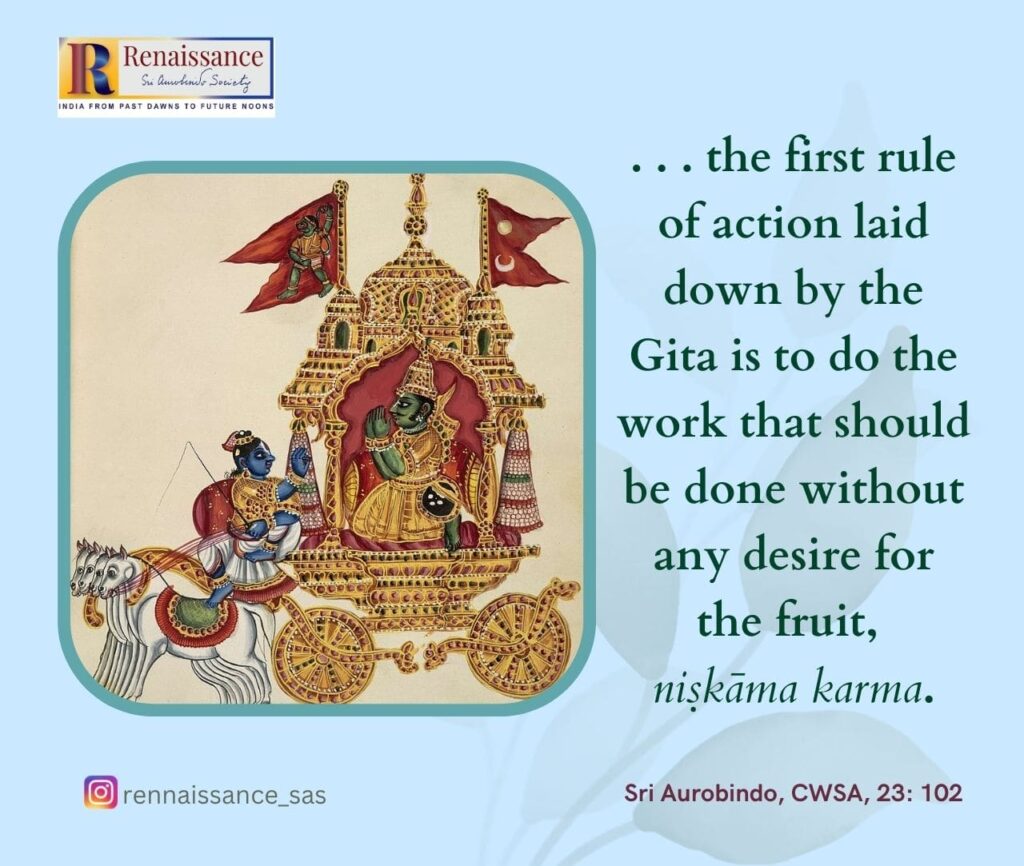
In the greater part of our action we use the principle very little if at all, and then even mostly as a sort of counterpoise to the normal principle of desire and to mitigate the extreme action of that tyrant impulse. At best, we are satisfied if we arrive at a modified and disciplined egoism not too shocking to our moral sense, not too brutally offensive to others.
And to our partial self-discipline we give various names and forms; we habituate ourselves by practice to the sense of duty, to a firm fidelity to principle, a stoical fortitude or a religious resignation, a quiet or an ecstatic submission to God’s will. But it is not these things that the Gita intends, useful though they are in their place; it aims at something absolute, unmitigated, uncompromising, a turn, an attitude that will change the whole poise of the soul.
Not the mind’s control of vital impulse is its rule, but the strong immobility of an immortal spirit.
Absolute Equality
The test it lays down is an absolute equality of the mind and the heart to all results, to all reactions, to all happenings.
If good fortune and ill fortune, if respect and insult, if reputation and obloquy, if victory and defeat, if pleasant event and sorrowful event leave us not only unshaken but untouched, free in the emotions, free in the nervous reactions, free in the mental view, not responding with the least disturbance or vibration in any spot of the nature, then we have the absolute liberation to which the Gita points us, but not otherwise.
The tiniest reaction is a proof that the discipline is imperfect and that some part of us accepts ignorance and bondage as its law and clings still to the old nature. Our self-conquest is only partially accomplished; it is still imperfect or unreal in some stretch or part or smallest spot of the ground of our nature. And that little pebble of imperfection may throw down the whole achievement of the Yoga!
There are certain semblances of an equal spirit which must not be mistaken for the profound and vast spiritual equality which the Gita teaches. There is an equality of disappointed resignation, an equality of pride, an equality of hardness and indifference: all these are egoistic in their nature. Inevitably they come in the course of the sadhana, but they must be rejected or transformed into the true quietude.
There is too, on a higher level, the equality of the stoic, the equality of a devout resignation or a sage detachment, the equality of a soul aloof from the world and indifferent to its doings. These too are insufficient; first approaches they can be, but they are at most early soul-phases only or imperfect mental preparations for our entry into the true and absolute self-existent wide evenness of the spirit.
Stages of Equality
For it is certain that so great a result cannot be arrived at immediately and without any previous stages. At first we have to learn to bear the shocks of the world with the central part of our being untouched and silent, even when the surface mind, heart, life are strongly shaken; unmoved there on the bedrock of our life, we must separate the soul watching behind or immune deep within from these outer workings of our nature.
Afterwards, extending this calm and steadfastness of the detached soul to its instruments, it will become slowly possible to radiate peace from the luminous centre to the darker peripheries.
In this process we may take the passing help of many minor phases; a certain stoicism, a certain calm philosophy, a certain religious exaltation may help us towards some nearness to our aim, or we may call in even less strong and exalted but still useful powers of our mental nature.
In the end we must either discard or transform them and arrive instead at an entire equality, a perfect self-existent peace within and even, if we can, a total unassailable, self-poised and spontaneous delight in all our members.
But how then shall we continue to act at all? For ordinarily the human being acts because he has a desire or feels a mental, vital or physical want or need; he is driven by the necessities of the body, by the lust of riches, honours or fame, or by a craving for the personal satisfactions of the mind or the heart or a craving for power or pleasure.
Or he is seized and pushed about by a moral need or, at least, the need or the desire of making his ideas or his ideals or his will or his party or his country or his gods prevail in the world. If none of these desires nor any other must be the spring of our action, it would seem as if all incentive or motive power had been removed and action itself must necessarily cease.
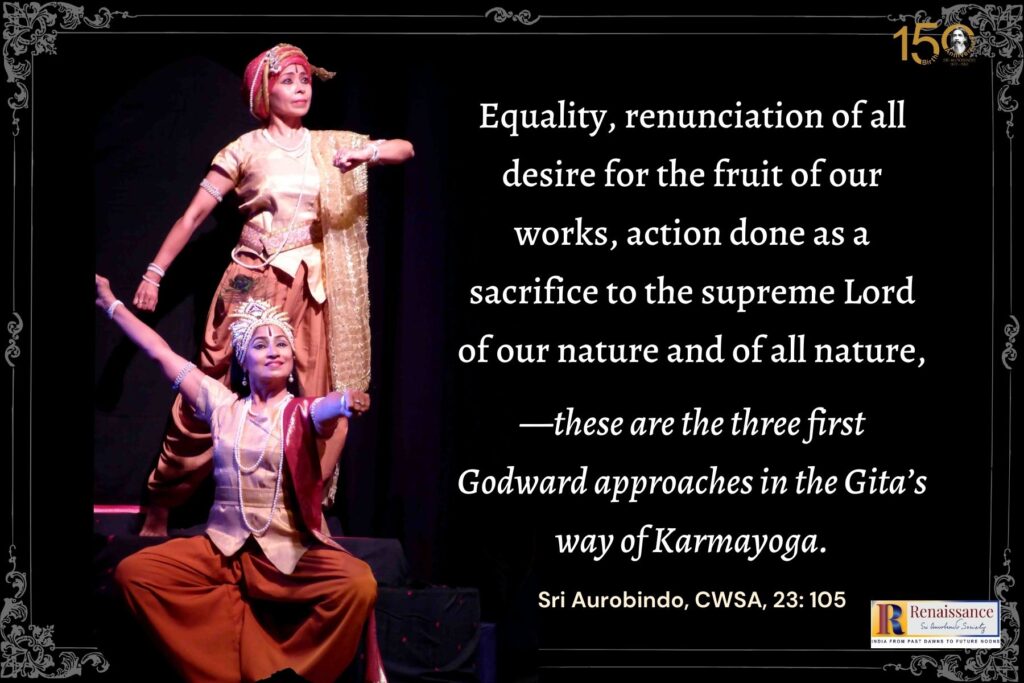
The Gita replies with its third great secret of the divine life. All action must be done in a more and more Godward and finally a God-possessed consciousness; our works must be a sacrifice to the Divine and in the end a surrender of all our being, mind, will, heart, sense, life and body to the One must make God-love and God-service our only motive.
This transformation of the motive force and very character of works is indeed its master idea; it is the foundation of its unique synthesis of works, love and knowledge. In the end not desire, but the consciously felt will of the Eternal remains as the sole driver of our action and the sole originator of its initiative.
Equality, renunciation of all desire for the fruit of our works, action done as a sacrifice to the supreme Lord of our nature and of all nature,—these are the three first Godward approaches in the Gita’s way of Karmayoga.
~ Sri Aurobindo, CWSA, Vol. 23, pp. 89-105
Also read:
Sri Aurobindo on Work as Sadhana
~ Design: Beloo Mehra


